- Home
- Victor Hugo
Les Misérables, v. 3/5: Marius Page 2
Les Misérables, v. 3/5: Marius Read online
Page 2
In the reign of Louis XV. children disappeared in Paris; the policecarried them off and no one knew for what mysterious employment.Monstrous conjectures were whispered as to the King's purple baths. Itsometimes happened that when boys ran short, the exempts seized such ashad parents, and the parents, in their despair, attacked the exempts.In such a case Parliament interfered and hanged--whom, the exempts? No,the fathers.
CHAPTER VII.
THE GAMIN WOULD HAVE HIS PLACE IN INDIAN CASTES.
The Parisian gamin almost forms a caste, and we might say that a boydoes not become so by wishing. The word _gamin_ was printed for thefirst time, and passed from the populace into literature, in 1834. Itmade its first appearance in a work called "Claude Gueux." The scandalwas great, but the word has remained. The elements that constitute theconsideration of gamins among one another are very varied. We knewand petted one, who was greatly respected and admired because he hadseen a man fall off the towers of Notre Dame; another, because he hadmanaged to enter the back-yard in which the statues of the dome of theInvalides were temporarily deposited, and steal lead off them; another,because he had seen a diligence upset; another, because he knew asoldier who had all but put out the eye of a civilian. This explainsthe exclamation of the Parisian gamin, at which the vulgar laughedwithout understanding its depth: "Dieu de Dieu! how unlucky I am! Justthink that I never saw anybody fall from a fifth floor!" Assuredly itwas a neat remark of the peasant's: "Father So-and-so, your wife hasdied of her illness: why did you not send for a doctor?"--
"What would you have, sir? We poor people die of ourselves." But if allthe passiveness of the peasant is contained in this remark, all thefree-thinking anarchy of the faubourien will be found in the following:A man condemned to death is listening to the confessor in the cart, andthe child of Paris protests,--"He is talking to the skull-cap. Oh, thecapon!"
A certain boldness in religious matters elevates the gamin, and it isimportant for him to be strong-minded. Being present at executions isa duty with him. He points at the guillotine and laughs at it, andcalls it by all sorts of pet names,--end of the soup; the grumbler;the sky-blue mother; the last mouthful, etc. In order to lose noneof the sight, he climbs up walls, escalades balconies, mounts trees,hangs to gratings, and clings to chimney-pots. A gamin is born to bea slater, as another is to be a sailor, and he is no more frightenedat a roof than at a mast. No holiday is equal to the Grève, and Samsonand the Abbé Montes are the real popular fêtes. The sufferer is hootedto encourage him, and is sometimes admired. Lacenaire, when a gamin,seeing the frightful Dautrem die bravely, uttered a remark whichcontained his future,--"I was jealous of him." In gamindom Voltaire isunknown, but Papavoine is famous. Politicians and murderers are mingledin the same legend, and traditions exist as to the last garments ofall. They know that Tolleron had a nightcap on, Avril a fur cap, Louvela round hat; that old Delaporte was bald and bareheaded, Castaingrosy-cheeked and good-looking, and that Boriès had a romantic beard;Jean Martin kept his braces on, and Lecouffé and his mother abusedeach other. "Don't quarrel about your basket," a gamin shouted to them.Another little fellow climbed up a lamp-post on the quay, in order towatch Debacker pass, and a gendarme posted there frowned at him. "Letme climb up, M'sieu le Gendarme;" and to soften the man in authority,he added,--"I shall not fall." "What do I care whether you fall ornot?" the gendarme replied.
Among the gamins a memorable accident is highly esteemed, and a ladattains the summit of consideration if he give himself a deep cut "tothe bone." The fist is no small element of success, and one of thethings which a gamin is very fond of saying is, "I am precious strong."To be left-handed renders you enviable, while squinting is held ingreat esteem.
CHAPTER VIII.
A CHARMING ANECDOTE OF THE LAST KING.
In summer he is metamorphosed into a frog, and from afternoon tonightfall, before the Austerlitz and Jena bridges, from the top ofcoal-rafts and washer-women's boats, dives into the Seine, with allpossible infractions of the laws of decency and of the police. Still,the police are on the watch, and hence results a highly dramaticsituation, which once gave rise to a paternal and memorable cry.This cry, which became celebrated about 1830, is a strategic warningfrom gamin to gamin; it can be scanned like a verse of Homer, witha notation almost as indescribable as the Eleusiac song of thePanathenæa, in which the ancient Evohé may be traced.--"Ohe, Titi,ohéée, here's the sergeant, pack up your traps, and be off through thesewer!"
Sometimes this gad-fly--that is the name he gives himself--can read,sometimes he can write, and draw after a fashion. He does not hesitateto acquire, by some mysterious mutual instruction, all the talentswhich may be useful to the public cause. From 1815 to 1830 he imitatedthe cry of a turkey; from 1830 to 1848 he drew a pear upon the walls.One summer evening, Louis Philippe, returning home on foot, saw avery little scamp struggling to raise himself high enough to drawwith charcoal a gigantic pear on the pillar of the Neuilly gates,and the King, with that kindness which he inherited from Henri IV.,helped the gamin to finish the pear and gave him a louis, saying, "Thepear is on that too." The gamin likes a commotion, and any violentcondition pleases him. He execrates the curés. One day in the Rue del'Université, one of these young scamps put his finger to his nose infront of the driveway of No. 69. "Why are you doing that at that gate?"a passer-by asked him. The lad answered, "A curé lives there." ThePapal Nuncio in fact resided there. Still, however great the gamin'sVoltairianism may be, if the opportunity is offered him of being achorister, he may possibly accept, and in that case assists civillyat mass. There are two things of which he is the Tantalus, and whichhe constantly desires without ever being able to attain them,--tooverthrow the government and have his trousers reseated. The gamin ina perfect state is acquainted with all the police of Paris, and whenhe meets one, can always give a name to his face. He numbers them onhis fingers, studies their names, and has his special notes abouteach. He reads the minds of the police like an open book, and will saycuriously and without hesitating,--"So-and-so is a _traitor_, So-and-sois _very wicked_, So-and-so is _great,_ So-and-so is _ridiculous_" (theitalicized words have all a peculiar meaning in his mouth). This onebelieves that the Pont Neuf belongs to him, and prevents _the world_from walking on the cornice outside the parapet; another has a maniafor pulling the ears of _persons_, etc. etc.
CHAPTER IX
THE OLD SOUL OF GAUL.
This lad may be traced in Poquelin, a son of the Halles, and againin Beaumarchais; for gaminerie is a tinge of the Gallic temper. Whenblended with common sense, it at times adds strength, in the same wayas alcohol when mixed with wine; at other times it is a fault. Homer,it is true, repeats himself, and we might say that Voltaire plays thegamin. Camille Desmoulins was a faubourien. Championnet, who abusedmiracles, issued from the pavement of Paris; when quite a lad, he"inundated the porticos" of St. Jean de Beauvais and St. Étienne duMont, and was on such familiar terms with the shrine of Saint Genevièveas eventually to give his orders to the vial of Saint Januarius.
The Parisian gamin is respectful, ironical, and insolent. He has badteeth because he is badly fed and his stomach suffers, and fine eyesbecause he has talent. He would hop up the steps of Paradise in thevery presence of Jehovah. He is clever at the savate, and all creedsare possible to him. He plays in the gutter, and draws himself up atthe sound of an émeute; his effrontery cannot be subdued by grape-shot;he was a vagabond and becomes a hero, and, like the little Theban,he shakes the lion's skin. Barra the drummer was a Parisian gamin; heshouted, "Forward!" and in an instant became a giant. This child of themud is also the child of the ideal; to see this we need only measurethe distance between Molière and Barra.
In a word, the gamin is a being who amuses himself because he isunhappy.
CHAPTER X.
ECCE PARIS, ECCE HOMO.
The gamin of Paris at the present day, like the Græculus of Rome informer time, is the youthful people with the wrinkle of the old worldon its forehead. The gamin is a grace for a nation, and at the sa
metime a malady,--a malady which must be cured. In what way? By light;for light is sanitary and illumining.
All the generous social irradiations issue from science, letters, thearts, and instruction. Make men, make men. Enlighten them in order thatthey may warm you. Sooner or later the splendid question of universalinstruction will be asked with the irresistible authority of absolutetruth; and then those who govern under the surveillance of French ideaswill have to make a choice between children of France and gamins ofParis, between flames in light and will-o'-the-wisps in the darkness.
The gamin expresses Paris, and Paris expresses the world. For Paris isa total; it is the ceiling of the human race, and the whole of thisprodigious city is an epitome of dead manners and living manners.The man who sees Paris imagines that he sees universal history, withsky and constellations in the intervals. Paris has a Capitol, theTown Hall; a Parthenon, Notre Dame; a Mons Aventinus, the FaubourgSt. Antoine; an Asinarium, the Sorbonne; a Pantheon, the Panthéon; aVia Sacra, the Boulevard des Italians; a Tower of the Winds, publicopinion; and ridicule has been substituted for the Gemoniæ. Its majois called the "faraud," its Transteverine is called the faubourien,its hammal the "fort de la Halle," its lazzarone the "pegre," and itscockney the "Gandin." All that is elsewhere is in Paris. Dumarsais'fish-fag can give a reply to the herb-seller of Euripides; Vejanus thediscobolus lives again in the rope-dancer Forioso; TherapontigonusMiles could walk arm-in-arm with Grenadier Vadeboncœur; Damasippus thebroker would be happy among the dealers in _bric-à-brac;_ Vincenneswould hold Socrates under lock, just as the Agora would pounce onDiderot; Grimod de la Reynière discovered roast-beef with tallow, inthe same way as Curtillus invented roast hedgehog. We have seen thetrapeze of which we read in Plautus reappear under the balloon of theArc de l'Étoile; the sword-swallower of Pœcile met by Apuleius is aswallower of sabres on the Pont Neuf; Rameau's nephew and Curculionthe parasite form a pair; Ergasites would have himself introduced toCambaceres by d'Aigre feuille; the four fops of Rome, Alcesimarchus,Phœdromus, Dicabolus, and Argiryppus descend the Courtille in Labatut'spost-chaise; Aulus Gellius stopped before Congrio no longer thanCharles Nodier did before Punchinello; Marton is not a tigress, butPardalisca was not a dragon. Pantolabus humbugs Nomentamus the gourmetat the Café Anglais; Hermogenes is the Tenor in the Champs Élysées,and Thrasius the beggar, dressed as Bobêche, carries round the hat forhim; the troublesome fellow who catches hold of your coat-button inthe Tuileries makes you repeat after two thousand years the apostropheof Thesperon,--_Quis properantem me prehendit pallio_? The wine ofSuresne is a parody of the wine of Alba; Père Lachaise exhales in thenight showers the same gleams as the Esquiliæ; and the poor man's gravebought for five years is quite equal to the hired coffin of the slave.
Seek for anything which Paris has not. The tub of Trophonius containsnothing which is not in Mesmer's trough; Ergaphilas is resuscitatedin Cagliostro; the Brahmin Vasaphanta is incarcerated in the Countde St. Germain; and the cemetery of Saint Médard performs quite asgood miracles as the Oumoumie Mosque at Damascus. Paris has an Æsopin Mayeux, and a Canidia in Mademoiselle Lenormand; it is startled asDelphi was by the flaming realities of the vision; it makes tablesturn as Dodona did tripods; it places a grisette upon a throne asRome placed a courtesan; and, after all, if Louis XV. is worse thanClaudius, Madame Dubarry is better than Messalina. Paris combines inan extraordinary type what has lived and what we have elbowed,--Greeknudity, the Hebrew ulcer, and Gascon puns. It mixes up Diogenes, Job,and Paillasse, dresses a ghost in old numbers of the _Constitutionnel,_and makes Chodrucnito a Duclos. Although Plutarch says that "thetyrant never goes to sleep," Rome, under Sylla as under Domitian,was resigned, and liked to mix water with its wine. The Tiber was aLethe, if we may believe the somewhat doctrinaire eulogium which VarusVibiscus made of it: _Contra Gracchos Tiberim habemus. Bibere Tiberim,id est seditionem oblivisci_. Paris drinks a million quarts of water aday; but that does not prevent it from beating the tattoo and ringingthe alarm-bell when the opportunity offers.
With this exception, Paris is good-natured. It accepts everythingroyally; it is not difficult in the matter of its Venus; its Callipygeis a Hottentot; provided that it laughs, it forgives; ugliness amusesit, deformity does it good, and vice distracts it; if you are drollyou may be a scoundrel; even hypocrisy, that supreme cynicism, doesnot revolt it; it is so literary that it does not hold its nose onpassing Basile, and is no more scandalized by Tartuffe's prayer thanHorace was terrified by the "hiccough" of Priapus. No feature of thehuman face is wanting in the profile of Paris; the Mabille ball isnot the Polyhymnian dance of the Janiculum, but the wardrobe-dealerhas her eyes fixed on the Lorette there, exactly as the procuressStaphyla watched the Virgin Planesium. The Barrière des Combats is nota Coliseum, but people are as ferocious there as if Cæsar were lookingon. The Syrian hostess has more grace than Mother Saguet; but if Virgilfrequented the Roman wine-shop, David of Angers, Balzac, and Charlethave seated themselves in Parisian pot-houses. Paris reigns, geniusesflash in it, and red-tails prosper. Adonaïs passes through it in histwelve-wheeled car of thunder and lightning, and Silenus makes hisentrance on his barrel. For Silenus read Ramponneau.
Paris is the synonym of Cosmos; Paris is Athens, Rome, Sybaris,Jerusalem, and Pantin. All civilizations are found there abridged,but so are all barbarisms. Paris would be very sorry not to have aguillotine; a little of the Place de Grève is useful, for what wouldthis eternal festival be without that seasoning? The laws have wiselyprovided for that, and, thanks to them, the knife drains drops of bloodupon this Mardi-Gras.
CHAPTER XI
THE REIGN OF RIDICULE.
There are no limits to Paris; and no other city has held this sway,which at times derides those whom it holds in subjection. "To pleaseyou, O Athenians!" Alexander exclaimed. Paris makes more than thelaw, for it sets the fashion; and it makes more than fashion, for itproduces routine. Paris may be stupid, if it think proper; at timesit indulges in that luxury, and then the universe is stupid with it;but Paris soon wakes up, rubs its eyes, says, "How stupid I am!" andlaughs in the face of the human race. What a marvel such a city is!How strange it is to find this grandeur and this buffoonery side byside; to see how all this majesty is not deranged by this parody, andthe same mouth to-day blowing the trumpet of the last judgment, andto-morrow a penny whistle! Paris has a sovereign gayety; but the gayetyis lightning, and its farce holds a sceptre. Its hurricane at timesissues from a furnace; its explosions, its days, its masterpieces,its prodigies, its epics, go to the end of the world, and so do itscock-and-bull tales. Its laugh is the crater of a volcano whichbespatters the world, and its jokes are sparks of fire. It imposesupon nations its caricatures as well as its ideal, and the loftiestmonuments of human civilization accept its ironies and lend theireternity to its jokes. It is superb; it has a prodigious July 14, whichdelivers the globe; its night of August 4 dissolves in three hours athousand years of feudalism; it makes with its logic the muscle of theunanimous will; it multiplies itself in every form of sublimity; itfills with its lustre Washington, Kosciusko, Bolivar, Bozzaris, Riégo,Bem, Manin, Lopez, John Brown, and Garibaldi. It is found whereverthe future bursts into a flash,--at Boston in 1779, at the Isle ofLeon in 1820, at Pesth in 1848, at Palermo in 1860; it whispers thepowerful watchword "Liberty" in the ear of the American abolitionistsassembled at Harper's Ferry, and in that of the patriots of Anconaassembled in the darkness before the Gozzi inn, on the sea-shore; itcreates Canaris, it creates Quiroga, it creates Pisacane, it radiatesgrandeur upon the earth; it was by going whither its blast impelledhim that Byron died at Missolonghi, and Mazet at Barcelona; it isa tribune under the feet of Mirabeau, and a crater under those ofRobespierre; its books, plays, art, science, literature, and philosophyare the manuals of the human race; it has Pascal, Regnier, Corneille,Descartes, and Jean Jacques; Voltaire for any moment, Molière for allages; it makes the universal mouth speak its language; it constructsin every mind the idea of progress; the liberating dogmas which itfuses are well-tried friends f
or generations, and it is with the mindof its thinkers and its poets that all the heroes of all nations havebeen formed since 1789. Still, this does not prevent it from playingthe gamin; and the enormous genius which is called Paris, whiletransfiguring the world with its light, draws Bouginier's nose withcharcoal on the wail of the Temple of Theseus, and writes CrédevilleVoleur upon the Pyramids.
Paris constantly shows its teeth, and when it is not scolding it islaughing; such is Paris. The smoke from its chimneys constitutes theideas of the universe; it is a pile of mud and stones if you like, butit is, before all, a moral being. It is more than grand, it is immense;and why? Because it dares. Daring is the price paid for progress. Allsublime contests are more or less the rewards of boldness. For theRevolution to take place, it was not enough that Montesquieu shouldforesee it, Diderot preach it, Beaumarchais announce it, Condorcetcalculate it, Arouet prepare it, and Rousseau premeditate it,--it wasnecessary that Danton should dare it.

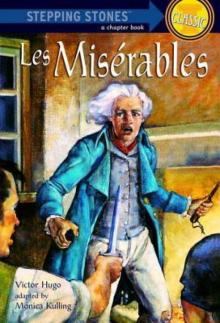 Les Miserables
Les Miserables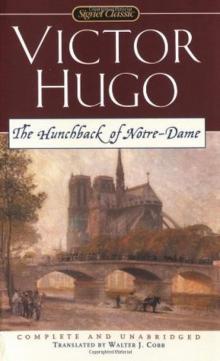 The Hunchback of Notre-Dame
The Hunchback of Notre-Dame The Man Who Laughs
The Man Who Laughs The Last Day of a Condemned Man
The Last Day of a Condemned Man The Toilers of the Sea
The Toilers of the Sea Waterloo
Waterloo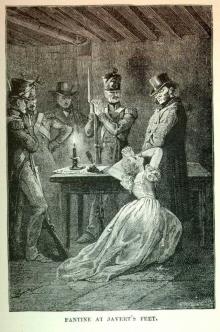 Les Misérables, v. 1/5: Fantine
Les Misérables, v. 1/5: Fantine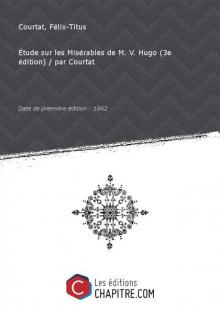 Les Misérables, v. 3/5: Marius
Les Misérables, v. 3/5: Marius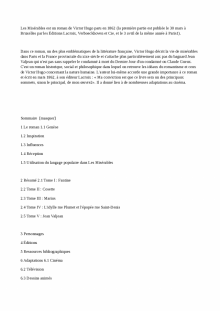 Les Misérables, v. 2/5: Cosette
Les Misérables, v. 2/5: Cosette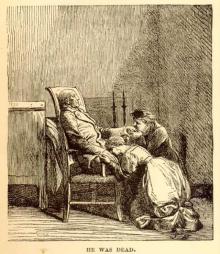 Les Misérables, v. 5/5: Jean Valjean
Les Misérables, v. 5/5: Jean Valjean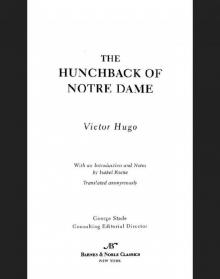 Hunchback of Notre Dame (Barnes & Noble Classics Series)
Hunchback of Notre Dame (Barnes & Noble Classics Series) Les Miserables (abridged) (Barnes & Noble Classics Series)
Les Miserables (abridged) (Barnes & Noble Classics Series)